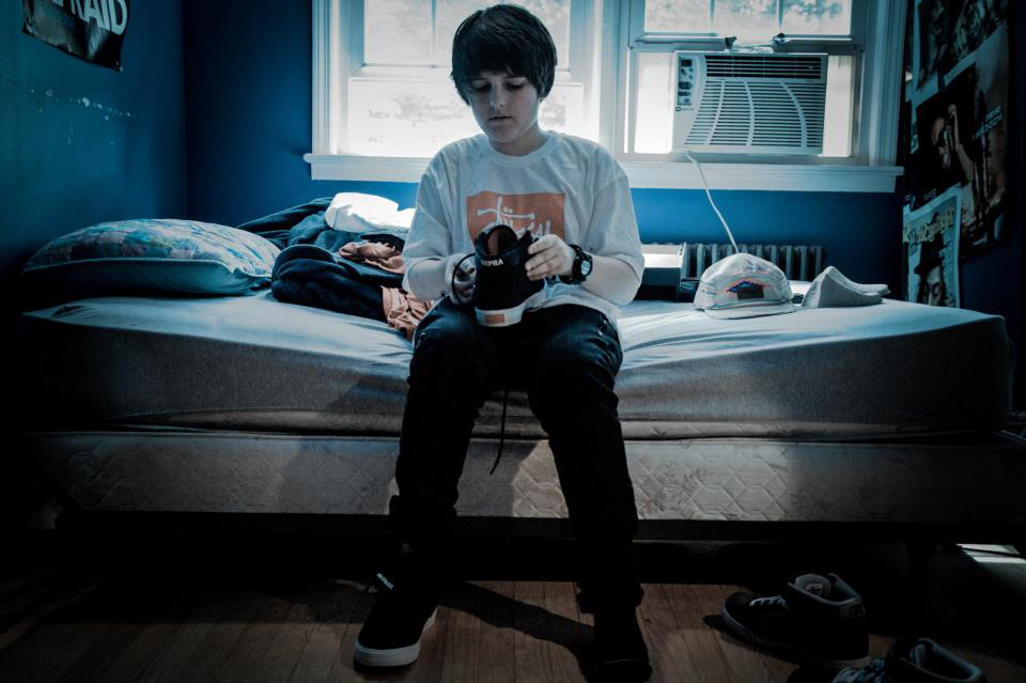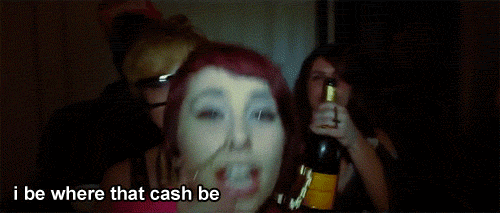Why Did A Major Label Just Pay $1.5 Million For A 15-Year-Old White Rapper?
The kids are alright - as long there's money to be made off them.

In the type of bloated, front-loaded deal that should have died with grunge, major label Warner/Chappell have signed a 15-year-old white rapper to a $1.5m, five-album contract.
Chris Miles first gained attention two years ago when an audition video of the then 13-year-old rapping was screened on America’s Got Talent, and although the kid is clearly talented, the performance wasn’t enough for him to continue on the show.
–
Last year’s Growing Pains mixtape has been downloaded close to 12,000 times, and while 13,800 Twitter followers and 39,000 YouTube subscribers are hardly figures to sneeze at, they aren’t the type of statistics that usually result in million-dollar recording contracts either. So why are Warner throwing money at a relatively unproven artist, and who do they think will care?
The odds are stacked fairly firmly against Miles in almost every regard, despite his impressive drive and clear talent. Hip hop has traditionally been built upon a bedrock of authenticity, and it is hard to imagine the community being welcoming of a 15-year-old white kid who signed a major deal off the back of a modestly-received mixtape and a television talent show appearance. He is being set up for a fairly spectacular fall, whichever way you cut it.
Miles’ most recent video 32 Bar Acapella serves purely to showcase his technical proficiency, and both the pop-friendly production of his mixtape and his frequent Drake remixes suggest that Miles is aiming for a fanbase roughly in line with twin Canadian powers Drake and Bieber, the latter of whom has served as a recent cautionary tale of what can happen if you achieve the type of early success that Warner will be hoping to court with Miles.

–
So, What’s The Problem?
Herein lies the problem: a $1.5 million, five-album deal shows a fundamental misunderstanding of Miles’ appeal. His trajectory so far is impressive — and has been possible — because it happened outside the label system. A then-14-year-old kid self-releasing a mixtape, building an online presence and aiming for the moon showcases the entrepreneurial possibilities that the Internet holds — although the 34,300 tweets he has shot out in just two and a half years suggests a machine of some sort is propelling Miles. For him to then fall into the archaic major label system, with its antiquated album cycles and outmoded contracts, seems a counter-intuitive path to success, especially considering the pressure to succeed straight out of the gates on a major, coupled with the short-lived nature of Internet success.
American rapper Kreayshawn signed to Columbia Records in 2011 off the back of her viral hit ‘Gucci Gucci‘, which attracted over three million viewers in a matter of weeks. The video has subsequently been watched over 47 million times, yet when Columbia released her major label debut, these viewers failed to translate into sales: the record sold 3,900 copies in the first week, a record first week sales low for a major label. Kreayshawn posted her royalty statement online, which showed the artist earned the princely sum of one cent.

There is also the very real novelty factor involved in success of this nature. Miles has, after all, come to prominence solely based on his age. While nobody is denying his talent, the appeal of an 18-year-old rapper is a less exciting one. Internet popularity is transient, and usually hinged on the ability to be neatly summarised. A video of a kitten somersaulting; an 80-year-old twerking; a thirteen-year-old rapping. These videos do what they say on the tin, and while Miles has managed to build an impressive independent following, there is likely to be little to no crossover between those who land on one of his videos, briefly marvel, then carry on living, and spend-happy consumers willing to follow a 15-year-old on a five-album journey.
–
Then There’s The Online Backlash
Contractual details aside, there is also the exploitative nature of such a record deal. While 15 is arguably old enough to be making real life decisions, this deal acts as yet another sign of a worrying trend, in which increasingly younger and younger kids are groomed for possible pop success. This week, 15-year-old Canadian Shawn Mendes looks set to debut in the higher reaches of the Billboard 200 with his single Life Of The Party after being ‘discovered’ on Vine. Last week saw the debut of The Voice Kids on the Nine Network, a spin off which focuses on kids aged between 8-14. Last Sunday’s debut saw 1.65m Australians tune in. A cap of last night’s episode by the Sydney Morning Herald this morning boasts the headline ‘The Voice Kids 2014 Unveils Teenage Heartthrob’. The heartthrob: thirteen-year-old Ethan. It goes without saying that this angle is problematic.
Aside from the very real confidence-crushing that comes with being judged live on national television, there is also the horror of Internet commentary to deal with. Recently My Kitchen Rules contestants Chloe James and Kelly Ramsay were the targets of online attacks, including death threats, photos of them with their eyes removed, and drawings of the pair hanging from a tree. The police took the hatred seriously enough to become involved, and Ramsay told WA Today the venom reduced her mother to tears. Now, imagine this anger unleashed on a group of 8-14 year-olds, on a show that targets the very same demographic prone to schoolyard bile. The results will be devastating, long-lasting, and unpredictable, and it is sadly hard to foresee a scenario in which the contestants of X Factor Kids aren’t routinely targets of relentless vitriol. There are no safeguards for this, nor can there be, short of Channel Nine aborting the show — unlikely considering the ratings.
Whether it is a fifteen-year-old bound to a long term legal contract at an age where most of us hadn’t thought past the next geography assignment, or pre-teens being gleefully torn apart online, it all represents a slippery slide that cannot lead anywhere positive.